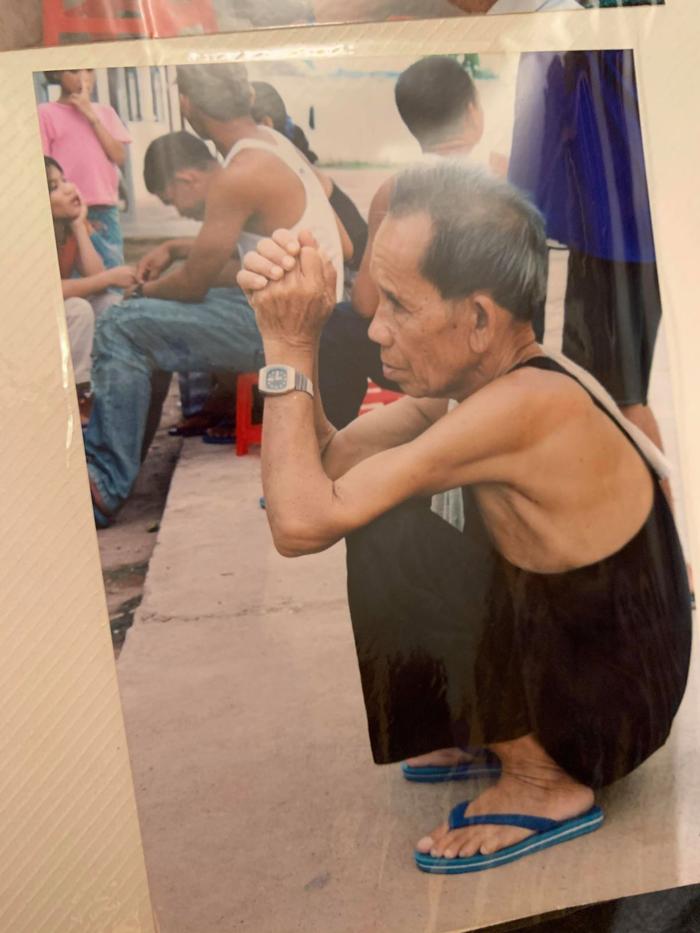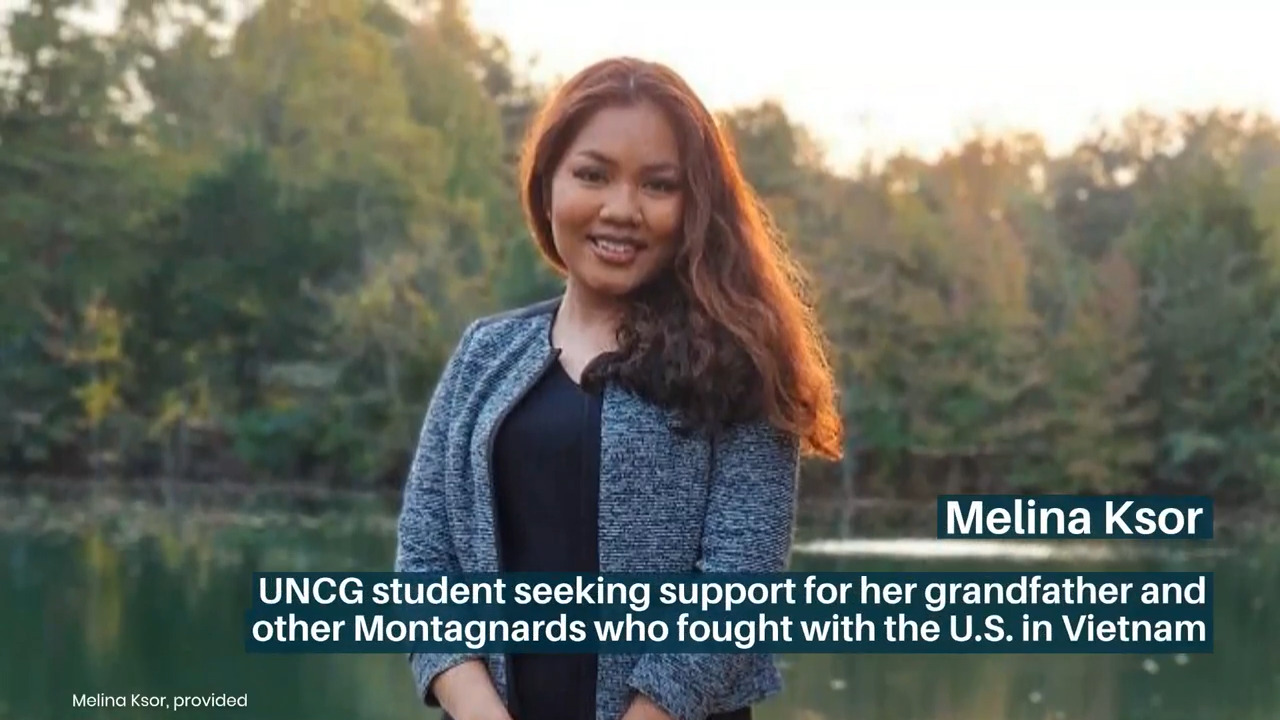The 109-year-old stroke survivor nodding off nearby only recently began talking about the missions in the dense jungles of Vietnam.
Of crawling on the jungle floor, ahead of the Americans, on the lookout for booby traps.
The American advisers, the name for soldiers there in an undeclared war against the country’s northern communist government, had recruited Y’bret Nie and other Montagnards as allies.
Their knowledge of geography and the jungles would help the Americans navigate the terrain. Her grandfather’s generation served as interpreters, scouts and soldiers alongside U.S. troops, according to Melina Ksor.
Nie considered himself one of them, the Special Forces he worked to keep safe.

“If my grandfather did not give the go,” Ksor said recently as her grandfather napped nearby, “they would not move forward.”
Blinded by the stroke seven years ago, Nie often sits holding the hand of his wife, Aya H, 97, and calling out for family members long gone. It would take decades and refugee status to get him into the United States at age 90. Within a few years, he became a U.S. citizen.
“My grandfather didn’t need to get his U.S. citizenship but he did because he loves this country and he loves his comrades,” Ksor said. “Those were his brothers in arms.”
Ksor, who graduates from UNCG next month and is headed to Duke this fall to pursue a career in public health, is also on a journey to get national recognition for him and the other Montagnards who helped during the war. Recognition that the 22-year-old feels all Montagnards who aided the U.S. Special Forces — including the nurses and the others in the villages who gave them food and a place to stay — deserve.
She appreciates the recognition offered by Special Forces volunteers, who conduct an honor burial ceremony for their Montagnard veterans when they can. They also present the family with an American flag.
But she says the government should make it standard and also allow burial in a military cemetery as an option.
“I want national leaders to recognize our people,” Ksor said.
Nie and the others never received financial benefits or national recognition even as they helped American soldiers navigate death traps.
“Because of them, they were able to make it back home to their families,” Ksor said.
A deep grip on my soul.
Although Ksor seeks to tell a story centering on the band of American and Montagnard brothers in the jungle, the story is as much about the plight of the indigenous people in modern-day America, where many Montagnards live in near-poverty and desperation, where assimilation means her cousins do not speak the same language as their grandfather, who never learned English. Although she has interpreted for much of her family since the first grade, she also carries guilt of feeling that she’s not doing enough.
Her older brother sacrificed going to college so she could. Her father, who worked hard labor jobs without complaint, and her mother, who works as a cleaning lady, cared for their three-generation household and made sure that every mouth in the house was fed when 13 relatives crowded into their three-bedroom house when extended family needed housing and help. Ksor spent years of grade school embarrassed by her mother’s limited proficiency in English. When other children at school talked about themed bedrooms and matching bed sheets, she dreamed up her own to avoid admitting she slept on the living room couch with two cousins.
She better understands her mother’s life in context now.
Going into the public health field is how she plans to do more now. She wants to help bring together those who are working for the same goal.
She wants better for the Montagnards.
“I feel like even though I’m just one woman,” Ksor said, “my ancestors’ spirits hold a deep grip on my soul.”
But in this moment, her thoughts are with her beloved Grandpa, who is the reason she is fluent in both English and their tribal language, because they could not otherwise communicate.
In a videotaped interview for her class project, he remembers when the Americans arrived. Nie, who once trained an elephant that was later taken by the French, said matter-of-factly that when the Americans asked, he joined them.
“I know the way,” he told her of his service with the Americans. “I showed the way.”
In 1975, after the Americans left the decades-old and bloody battle, which wasn’t popular in the United States and ended with tens of thousands of American casualties, the Montagnard soldiers took cover in remote jungle outposts near Cambodia.
They continued to fight Communist Vietnam until a 1992 cease-fire, 17 years after the war ended for the Americans.
In the 1990s, the Montagnards were found hiding in the remote jungles of northern Cambodia.
Nie and other faithful Montagnards had been given documents of their service.
The VietCong later destroyed everything in their path, including homes, libraries and personal items of the Montagnards, which for Nie included the paperwork, he told his granddaughter in the videotaped interview.
In fleeing, the members of their village walked for nine days and nine nights with little food. They ate what they came across, like bananas, to get to a refugee camp in Cambodia. They felt targeted for refusing to renounce their Christianity and for helping the Americans.
When they got to the refugee camp, some of them were turned away, including Ksor’s grandparents, which forced the couple to live just outside the camps in the nearby jungle.
Her grandmother suspects they only wanted young and healthy people in the camps.
Ksor’s mother would leave the camps to sneak food to them and work on a plan to get them inside. She got the attention of Carl Ragan, a Vietnam vet still there who she shared Nie’s story with, and who was able to get the grandparents into the camp.
Ksor was 3 when she and most of Nie’s family — three daughters and two sons, and their families — left the camp on their way to the United States in 2002.
“I remember riding on the airplane and seeing the stars and not knowing that it was just city lights,” Ksor said. “I was sitting next to my father and he said, ‘We are in America.’ “
It had been the American servicemen, notably Special Forces in North Carolina, that pushed the U.S. to resettle thousands of Montagnards as refugees so they could escape persecution from the Vietnamese government for helping the Americans.
Of the thousands who were relocated to the United States, most were resettled in North Carolina, home of Fort Bragg and U.S. Special Forces, who directly benefited from the Montagnards’ guidance during the Vietnam War.
Greensboro now has the largest Montagnard community outside of Vietnam, officials estimate.
The resettlement agency helped D’jon Ya, Ksor’s mother, apply for Medicaid and food stamps. America was in a recession and none of the adults could find jobs right away. They would have to navigate their new life largely on their own, although some of the American soldiers had started nonprofits to provide a small measure of support to help them.
“They were kind of left on their own,” Ksor said.
A resolution introduced in the U.S. Senate by North Carolina Republicans Richard Burr and Thom Tillis in 2019 both recognizes the Montagnards of North Carolina and condemns the human rights abuses suffered by the relatives they left behind in the Socialist Republic of Vietnam. But it was never enacted.
Even as they are credited with saving American lives, only U.S. service members are allowed to be buried in Arlington National Cemetery. A granite memorial erected there in 2015 pays tribute to those known as “The Forgotten Army” and the “Montagnard Special Forces of the Jungle” — the Montagnard allies, the Khmer Krom and Cham and other indigenous minority groups in the Central Highlands.
“They will forever be remembered for their courage and valor … mourned for their sacrifice,” the marker reads.
“They were staunchly loyal to the United States,” Dr. Grant McClure of the Counterparts Veterans Association, a combat veteran and one of the organizers of the memorial, told the News & Record before its unveiling at Arlington National Cemetery. “We want to at least give tribute for all the effort they put forward, for them to then be abandoned.“
Ksor plans to get a master’s degree in population health sciences, an area of study and practice that could help create better lives for the Montagnards and others who are underserved. She knows first hand how change happens.
“It took my entire household to believe in me and despite our circumstances I’m going to Duke this fall,” Ksor said.
She has a partial scholarship and is taking out loans for what she truly believes can give the Montagnards the support they need.
“It’s more than medicine, it’s taking personal experiences and looking at the inequities in a system and being able to address that,” Ksor said. “It’s giving a voice to those who aren’t heard so we can change policies and systems.”
Ya had pushed her daughter to excel so that she could create the future she wanted. Ksor had finished English for speakers of other languages classes by first grade and by third grade was given the chance to skip a grade or take accelerated courses. She served as student body president and captain of the safety patrol while in grade school, but said she later suffered difficult setbacks.
It took the love of her mother to get her through the difficulties. Ya later watched her graduate high school with a 4.0 GPA and and later a partial scholarship for her research at UNCG.
And graduate with this passion for bringing honor to her grandfather and her ancestors.
“I tell my daughter,” Ya said, “you are a strong woman.”
Ksor hopes her grandfather will benefit from that strength. She’s hoping that his plight will lead to a national conversation followed by action.
“I want to make sure I do everything I can for him,” she said, her voice cracking.
News & Record
Nancy McLaughlin
